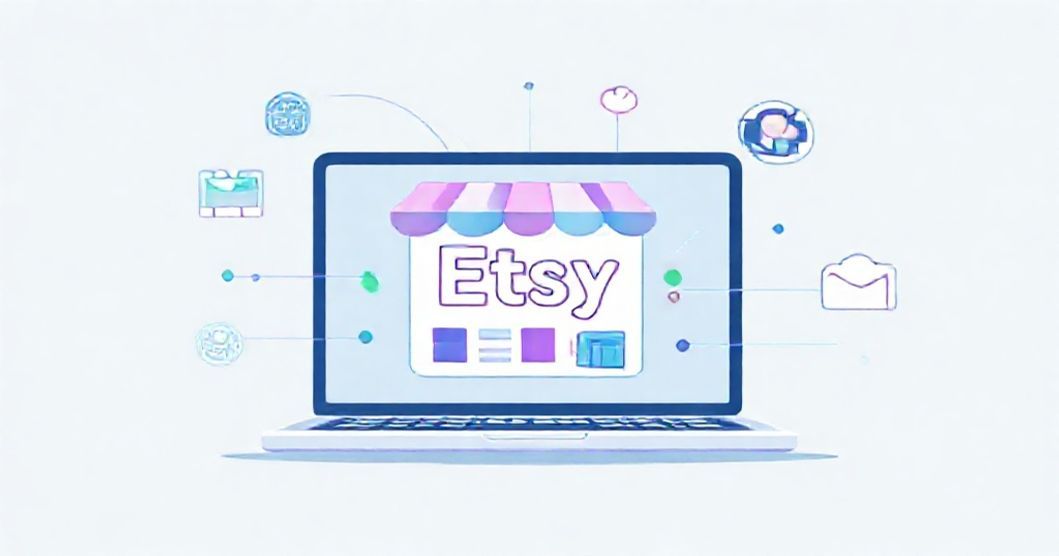In the competitive landscape of online retail, Etsy sellers constantly seek innovative ways to enhance efficiency and expand their reach. The strategic implementation of Etsy integrations stands out as a pivotal approach for achieving these goals. These powerful tools connect your Etsy shop with various external platforms, automating tasks, streamlining workflows, and ultimately freeing up valuable time. Understanding the diverse range of available integrations is crucial for any seller aiming to elevate their business operations and maximize profitability in the digital marketplace.
Understanding Etsy Integrations: The Foundation of E-commerce Efficiency
Etsy integrations refer to third-party applications or services designed to connect directly with an Etsy shop’s backend. This connectivity enables automated data exchange, synchronizing information across multiple platforms. From managing inventory across various sales channels to automating shipping processes and simplifying accounting tasks, these integrations are instrumental in creating a more cohesive and efficient e-commerce ecosystem for sellers. Their primary purpose is to reduce manual effort and mitigate the risk of human error.
Streamlining Operations with Etsy Integrations
The core benefit of integrating your Etsy store with other systems lies in its ability to streamline daily operations. Imagine not having to manually update stock levels on multiple platforms after a sale, or spending hours inputting sales data into your accounting software. Etsy integrations automate these time-consuming tasks, allowing sellers to focus on product creation, marketing, and customer service. This operational efficiency directly translates into enhanced productivity and a more organized business structure, fostering sustainable growth.
Key Categories of Etsy Integrations
Etsy integrations fall into several distinct categories, each addressing a specific operational need within an e-commerce business. Understanding these categories helps sellers identify the most impactful tools for their unique requirements. The primary types include integrations for inventory management, shipping and fulfillment, accounting, marketing and customer relationship management (CRM), and specialized services like print-on-demand or dropshipping. Each category offers unique advantages, contributing to a holistic business improvement strategy for Etsy sellers.
1. Inventory Management Integrations for Etsy Sellers
Managing inventory accurately is paramount for any online seller, especially when selling across multiple platforms. Inventory management Etsy integrations automatically sync stock levels between your Etsy shop and other sales channels like Shopify or WooCommerce. This prevents overselling, reduces the risk of disappointing customers with out-of-stock items, and provides a centralized view of all your products. Such tools ensure that your product listings are always current and consistent, saving considerable time and preventing costly errors.
2. Shipping and Fulfillment Integrations for Seamless Delivery
Efficient shipping is critical for customer satisfaction and repeat business. Shipping integrations for Etsy connect your store directly with shipping carriers or fulfillment services. These tools automate label generation, calculate shipping costs, and provide real-time tracking updates to customers. Integrating with platforms like ShipStation or Pirate Ship can significantly reduce the time spent on order fulfillment, often securing discounted shipping rates and improving the overall post-purchase experience for buyers. This automation is a game-changer for high-volume sellers.
3. Accounting and Bookkeeping Integrations for Financial Clarity
Keeping accurate financial records is essential for tax purposes and business analysis. Accounting Etsy integrations automate the transfer of sales data, expenses, and transaction fees directly into your accounting software, such as QuickBooks or Xero. This eliminates manual data entry, reduces errors, and provides a clear, up-to-date overview of your financial health. Sellers can easily generate reports, track profitability, and simplify tax season preparations, ensuring compliance and informed decision-making regarding their Etsy business finances.
4. Marketing and CRM Integrations to Grow Your Etsy Shop
Effective marketing and strong customer relationships are vital for business growth. Marketing and CRM Etsy integrations help automate email campaigns, manage customer interactions, and track marketing performance. By integrating with platforms like Mailchimp or HubSpot, sellers can segment their audience, send personalized promotions, and nurture customer loyalty. These integrations enable targeted outreach, helping Etsy sellers convert visitors into repeat buyers and build a strong brand presence beyond the Etsy marketplace itself.
5. Print-on-Demand (POD) and Dropshipping Integrations
For sellers utilizing print-on-demand or dropshipping models, specialized Etsy integrations are indispensable. These tools connect your Etsy shop with POD suppliers or dropshipping fulfillment centers, automating the order processing and production flow. When a customer places an order, the integration automatically sends it to the supplier for creation and direct shipment. This eliminates the need for inventory management and physical handling, making it an attractive model for specific product types and potentially offering higher profitability margins by reducing overhead costs.
Choosing the Right Etsy Integration Tools: A Strategic Approach
Selecting the most suitable Etsy integration tools requires careful consideration of your business needs, budget, and growth aspirations. Begin by identifying your biggest pain points or areas where you spend the most manual effort. Research different solutions, read reviews, and compare features to ensure compatibility with your existing systems and future goals. A strategic approach involves prioritizing integrations that offer the most significant impact on efficiency and profitability, rather than adopting every available tool.
Evaluating Integration Costs and ROI
The cost of Etsy integrations can vary widely, from free basic versions to premium subscriptions costing several hundred dollars per month, depending on the breadth of features and usage volume. It is crucial to evaluate the potential return on investment (ROI) before committing to any tool. Consider the time saved, errors reduced, and potential revenue increase through automation. A well-chosen integration should quickly pay for itself by optimizing processes, allowing you to reallocate resources to more value-generating activities within your Etsy business.
Platform Compatibility: Connecting Etsy to Other E-commerce Stores
Many Etsy sellers also operate stores on other e-commerce platforms like Shopify, WooCommerce, or Squarespace. Integrations designed for platform compatibility are essential for managing a multi-channel selling strategy. These tools synchronize product listings, inventory, and orders across all your stores, providing a unified management interface. This prevents discrepancies, offers a consistent customer experience regardless of where they purchase, and consolidates sales data for easier analysis. Seamless multi-platform integration is key for expanding your market reach.
Maximizing Profitability Through Smart Etsy Integrations
Ultimately, the goal of implementing smart Etsy integrations is to maximize profitability and ensure the long-term success of your business. By automating repetitive tasks, reducing operational costs, and improving customer satisfaction, these tools contribute directly to your bottom line. They allow sellers to scale their operations without proportionally increasing their workload, providing a significant competitive advantage. Strategic integration adoption empowers Etsy shop owners to focus on creativity, innovation, and strategic growth initiatives.
Conclusion: Elevating Your Etsy Business with Strategic Integrations
Embracing the power of Etsy integrations is a strategic imperative for modern sellers aiming for efficiency, scalability, and sustained growth. From meticulously managing inventory and automating shipping to simplifying accounting and enhancing marketing efforts, these tools offer a comprehensive solution for optimizing every facet of your Etsy business. By carefully selecting and implementing the right integrations, sellers can transform their operational workflows, reduce manual burdens, and unlock new levels of productivity and profitability, positioning their shops for enduring success in the dynamic e-commerce landscape.





